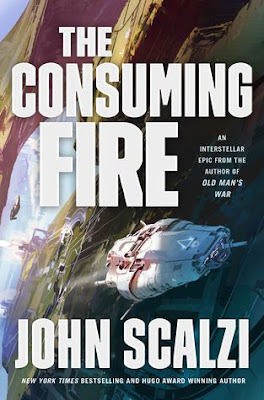I read the first book in John Scalzi's Interdependency Series (The Collapsing Empire) several years ago and probably would have gotten more out of the first 100 pages or so of this second book (The Consuming Fire) if I had reminded myself what happened there before diving in (I had a general idea of the Flow and the Emperox, but I had forgotten the who's who of the various political intrigues, a lot of which I admit I have trouble following or caring much about).
Honestly the book didn't get super interesting to me until about halfway through, but then some really cool stuff started to happen (more on that in spoilery section).
I also have to say I think that while Scalzi's acerbic wit is still there, the patented Scalzi snark is toned down a bit in this volume, and the book is honestly better for it. You still get a few little smirks now and then, but honestly Scalzi's dialogue can sometimes be a bit extra and get in the way of the story (as if everyone is speaking in carefully-crafted tweets at all times). I appreciated the milder version of all that.
Okay, I have to get into some mild spoilers here. So be warned.
<MILD SPOILERS AHEAD>>
We find out that there are still humans out there in the wide universe outside the Interdependency. Some of them have evolved to be more fit for life in a low-G environment, one of them is the downloaded personality in the form of a conscious ship. We also later find out that the Interdependency never really covered up the existence of these other humans. It was just sort of conveniently forgotten.
Which I think brings up interesting philosophical points about history, just as the first volume brought up interesting philosophical points about scientific disagreement. When I've taught classes outside of the "traditional Western canon" such as my course on Ancient Women Philosophers in India and Greece or my course in Pre-Hispanic Mesoamerican Philosophy, people often wonder if there's any historical evidence to go on. And I admit I once asked myself the same question. But it turns out, there's actually quite a lot. Now, some of this evidence was deliberately destroyed (the Spanish destroyed a lot of Maya and Aztec material, for example), but a lot of this material has been there all along, just waiting for someone to notice it.
In The Consuming Fire, there was never some great purge to keep people from discovering these other humans. As one character notes, deliberately stifling something is a sure way to make someone want to find out about it. A better way is to just stop talking about it and let it fade away into the background.
It's easier to not notice the contributions of ancient women philosophers when you convince yourself that women can't do or didn't do philosophy in any meaningful sense in ancient times. It's easier to assume that Mesoamerican cultures didn't produce any philosophy when you assume that philosophy is really only the domain of a handful of white men (as has been the dominant European narrative since at least the 18th century up until today, although the discipline of philosophy has today conveniently forgotten its racist origins).
Not all of this evidence has survived (deliberate purging has been a factor both for women in Ancient Greece and India and for Mesoamerican cultures), but the more you look into it, the more you realize that this evidence has been there all along, waiting for historians of philosophy to notice it and conceptualize it as philosophy.
And if this can happen in the space of a few thousand years on a single planet, imagine how much more this could occur across dozens of planets, tens of thousands of years, and hundreds of light years? Could it be that history is not so much written by the victors (although that is true to some extent), but by those who care to notice or those who have some idea what they're looking for?
But then, where do we get these ideas of what's important and worth noticing (another character points out that historians must always pick and choose)? Does it turn out that history is a matter of interpretation after all, entirely driven by our interests and desires in the present? Is all history -- whether of the Earthly past or some science fictional future -- really a history of the present?
I'm not sure. I'd like to retain a bit of realism about history and the very concept of "what really happened." After all, as much as some US conservatives would like to believe, for instance, that American slavery wasn't that bad or that its legacy does not continue in the US, they are very much wrong about this. But maybe as in all things (science, history, philosophy, etc.), at a deeper level the story is more complicated than it appears.
And Scalzi in any case makes these questions a great deal more entertaining than I have here!
See also my Goodreads review.

No comments:
Post a Comment